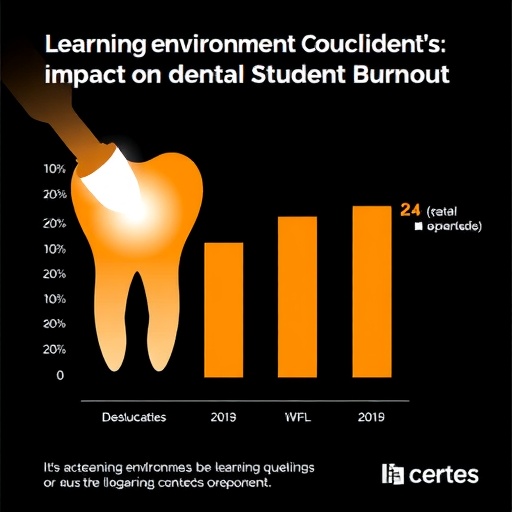In a groundbreaking study published in “BMC Medical Education,” researchers led by Shekarchizadeh and colleagues delve into the intricate relationship between dental students’ perceptions of their learning environments and the stress associated with academic burnout. This phenomenon, particularly pronounced in the demanding field of dental education, poses a significant challenge for students, educators, and institutions aiming to foster a productive educational framework.
The research employs a structural equation modeling approach, a sophisticated statistical technique that allows for the examination of complex relationships among observed and latent variables. By utilizing this method, the authors aim to uncover the underlying factors that influence students’ experiences in their educational settings. This analytical approach offers a nuanced perspective rather than merely correlational insights, allowing for a deeper understanding of the pedagogical dynamics at play.
Academic burnout is an increasingly recognized issue, particularly in rigorous fields like dentistry, where the combination of high expectations, lengthy study hours, and the emotional toll of patient care can lead to overwhelming stress. The study highlights how students’ perceptions of their learning environments can directly impact their mental health and academic performance. The authors emphasize the need to identify and modify elements within these environments to mitigate burnout’s adverse effects.
The quality of the learning environment comprises various factors, including teaching methods, peer interactions, support systems, and institutional culture. Understanding how these variables interrelate can empower educational leaders to make informed changes that enhance student well-being. The research underscores the importance of creating supportive ecosystems that prioritize students’ mental health, aiming for a holistic educational approach.
Furthermore, the findings suggest that misalignments between students’ expectations and their real experiences in the learning environment serve as significant stressors. When students perceive their education as unaligned with their expectations, they may encounter feelings of inadequacy and disconnection. The research calls for further investigation into how educational institutions can bridge this gap, ensuring that students feel adequately prepared and supported throughout their journeys.
The implications of this research extend beyond the confines of dentistry, touching on broader educational practices in higher education. By recognizing and addressing the links between learning environments and student stress, institutions can adopt a proactive stance towards mental health, fostering resilience among students. This study serves as a clarion call for innovation and reform in educational strategies, advocating for environments that actively promote well-being rather than inadvertently perpetuating stress.
In light of these findings, the authors propose several actionable strategies for educational institutions. These include enhancing communication channels between students and faculty, integrating mental health resources into the curriculum, and fostering collaborative learning spaces that promote peer support. Such initiatives not only address immediate concerns related to burnout but also prepare students for the challenges they will face in their professional careers.
Moreover, the research presents a unique dimension by focusing on dental students, who often experience unique stresses related to patient care and clinical responsibilities. By tailoring interventions specifically for this group, educators can ensure that their approaches are both relevant and effective. This attention to specificity is vital since one-size-fits-all solutions often fail to address the nuanced challenges faced by different student populations.
The structural equation modeling employed in the study highlights the complexity of the interactions at play. Rather than viewing students’ experiences in isolation, the research illustrates how numerous interconnected factors contribute to academic stress. This holistic perspective is crucial for developing comprehensive strategies that address the root causes of burnout rather than merely alleviating its symptoms.
In conclusion, the study conducted by Shekarchizadeh et al. serves as an essential contribution to the ongoing dialogue surrounding academic burnout. It emphasizes that a proactive approach to understanding and improving the learning environment is crucial for enhancing student well-being. The research advocates for a shift in focus from merely academic outcomes to a more integrated understanding of the student experience, which encompasses mental health, support, and engagement.
As educational practices continue to evolve, it is imperative that institutions consider the insights from this research to craft environments where students not only thrive academically but also maintain their mental health throughout their educational journeys. The findings underscore a fundamental truth: the quality of the learning environment plays a pivotal role in shaping students’ experiences, and thus, their overall success.
In a world where academic pressures are ever-increasing, the call for meaningful change in educational practices cannot be overstated. The outcomes of this research provide a roadmap for next steps, encouraging educational leaders to embrace innovative approaches that prioritize resilience and student wellness. Only then can we expect to see a fundamental transformation in the educational landscape that supports future generations of learners.
Subject of Research: The relationship between perceptions of the quality of the learning environment and stress related to academic burnout among dental students.
Article Title: The relationship between perceptions of the quality of the learning environment and stress related to academic burnout among dental students: a structural equation modeling approach.
Article References:
Shekarchizadeh, H., Mohebbi, S.Z., Abbasi, S. et al. The relationship between perceptions of the quality of the learning environment and stress related to academic burnout among dental students: a structural equation modeling approach.
BMC Med Educ 25, 1384 (2025). https://doi.org/10.1186/s12909-025-08003-y
Image Credits: AI Generated
DOI: 10.1186/s12909-025-08003-y
Keywords: academic burnout, dental students, learning environment, structural equation modeling, mental health.




